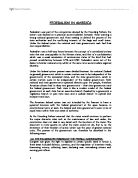Federalism implies a wide distribution of power among many centres and thus goes a long way to providing the checks and balances required to effectively control power. The more decentralised political power is, the more difficult its misuse will be. Furthermore the chief merit of federalism lies in its capacity to accommodate diversity. Therefore it is inferred that federalism could be considered to be the ideal system for a country which is subdivided in sufficiently autonomous and small subunits of religion, culture, language etc.
In the USA despite the system of federalism created by the framers, there were still those that feared the power of the federal government. Remembering the lessons taught by the Baron de Montesquieu, they utilized a system of separation of powers to brake up the power of the federal government. Within the system is what is called checks and balances. Each branch of the government has the power to inspect and impose limits to the other. This ensures that no branch ever gains too much power. The national government and the state governments co-exist. Therefore, we always have to watch whether some power being asserted by the federal government is in fact allowed under the Constitution and we must also watch whether some power asserted by the states is limited in favour of federal power. Federal government has limited powers. The three federal branches can only exercise powers specifically granted to them by the United States Constitution.
The doctrine of parliamentary supremacy found in the UK is wholly inconsistent with a federal form of government, such as that which exists in the United States. In a federal system the authority of the central legislature is limited by that possessed by the legislative organs of the governmental units which make up the federation. However, despite this basic difference between the American and English constitutional systems, we cannot obtain a clear picture of the functioning of federalism in the US since not all federal governmental systems are alike.
Judicial independence is also very significant to federalism. Since political safeguards seem to be inadequate to protect federalism, judicial safeguards seem more and more useful. Judicial independence is a necessary condition for judicial safeguards. Current history provides evidence that it is possible for the court to uphold federalism, not just as a referee of interstate dispute, but also as an umpire over federal government behaviour. The judicial independence is necessary to regulate the activities of the federal government and provide stability and equality. The current form though of judicial independence is not enough, since it does not have the power to constrain the federal government adequately. Improvements need to be made in order to establish an effective organ of control.
At first sight federalism is very simple. The basic idea is that relations between states should be conducted under the rule of law. Conflict and disagreement should be resolved through peaceful means rather that through coercion or war. Already the institutions in Brussels have many of the features of a system of government: an elected parliament, an executive, a legal system and a budget. It is guaranteed that by assembling the EU institutions like a government we are able to get the best out of the European Union. Perhaps the idea of a world government is an utopia, nevertheless federalism is better thought of as a direction rather than a destination. A global democracy is plainly not on the cards, but greater democratic input into the World Trade Organisation, a more equal distribution of decision making power on economic questions between the north and the south, and a more effective protection of human rights around the world might be.
The world federation undoubtedly represents a long term objective. However it is the only perspective in which it is conceivable to provide a positive and democratic response to growing global interdependence, which has already transformed the world into a community of destiny, and to the crisis of the national states, which are by now clearly inadequate of copping with the great challenges the world is faced upon. This explains why in all the world integration processes are under way. Europe is the continent where this process is most advanced. The European Federation will represent the first example in history of the overcoming of the national dimension of the state, and constitutes a unification model for all the regions of the world.
World federalists recognize that many of the most serious problems facing humanity are beyond the capacity of nations to resolve on their own or by mere coalitions of power between states. A stronger form of unity is needed. Federalism.
The question whether federalism is unrealistic can be best be answered in the words of Monet. Bismarck described politics as the art of the possible. Jean Monet a century later updated this notion. Politics he said is the art of making possible what is necessary.
POINTS CITED:
1.
2. Collin’s Dictionary of Law 2ND Edition
3. Dicey’s, Law of the Constitution
4. Jenna Bednar’s, Federalism, Judicial Independence and the Power of Precedent
KLEOPA VALENTINA
Conrad C. The federal government and us 1989
Eisenhardt History of Law 3rd Edition 1999
www.wfm.com. Cited from the site of world federalists movement
Prof. Helmut Kohler, Burgerliches Gesetz, 20th Edition (Translated)







